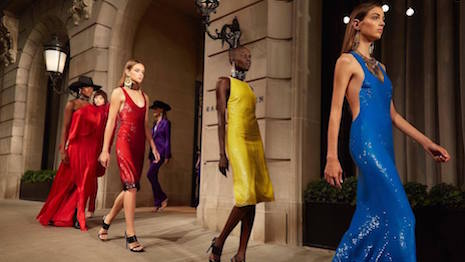- About
- Subscribe Now
- New York,
November 8, 2017

 WWD tracks trends during New York Fashion Week, with IBM Watson. Image credit: Ralph Lauren
WWD tracks trends during New York Fashion Week, with IBM Watson. Image credit: Ralph Lauren
While artificial intelligence has been thought of as computerized solution lacking creativity, a new report from Fashionbi explains that AI-powered creativity will be a new frontier for fashion.
Through the use of data, fashion brands are now looking into creative solutions that build a unique strategy for streamlining trends as well as personalization. AI is now also powering three facets of fashion, according to Fashionbi’s Artificial Intelligence in Retail report, such as customer service, product design and within the shopping experience.
“Artificial intelligence is entering the field of creativity, which is a playground of the human beings,” said Yana Bushmeleva, chief operating officer at Fashionbi, Milan. “We are used to the fact that the new fashion collections were mainly reflecting the creativity of a designer, now the new product can be the result of BIG data elaboration.”
Artificial intelligence in fashion
AI is being used consistently with customer service, with data and bots helping assist consumers with anything they could possibly need.
But this sector is beaming with innovation with many brands leading the way in new creative solutions. While the beauty sector has been leading the way in AI and AR to help customers discover products through digital testing and recommendations, fashion brands are also joining the race.
For instance, a platform named The Take allows users to shop items on television and film through machine learning by identifying products visually and where to purchase. Another platform, Shoe Gazer, identifies shoes through mobile devices’ camera lens and locates where to purchase.
For product development, WWD is working with IBM’s Watson developed a solution that discovers the upcoming trends by sorting the NYFW runway shows to determine reoccurring patterns and style.
In terms of shopping experiences, retailers are leveraging AI to make one-of-a-kind experiences. For example, magazine publisher Hearst created a virtual reality-shopping destination last year for the holidays with Blippar.
Guests used their phones to find hidden gifts and win prizes.
It is important for brands to innovate in this area. Consumers are interested in personalized experiences that can be had with AI, and they are willing to share data to get them.
Additional insight
In an era of fast fashion, latching onto trends quickly is key to successful apparel designs, but could AI designers make fast fashion even faster?
Amazon is reportedly working on machine learning technology that can analyze what makes an outfit stylish and theoretically create entirely new designs along those lines. With this potential in mind, artificial intelligence could be a key factor in the future of fashion design (see more).
It is imperative for marketers to carefully walk the line between beneficial and harmful implementation of artificial intelligence, says an executive from Havas.
During the session “Lessons from the Frontline” at Ad:tech 2017 on Nov. 2, Havas' global head of marketing innovation explained that it would be vital for marketers to develop a set of ethics to navigate the murky AI industry. The benefits of being able to accurately identify consumers and who they are as a person through AI are endless (see more).
“During the research, we found that the artificial intelligence can be applied in next fields of the fashion industry: Customer service, in product design, and in retail for the innovative shopping experience,” Ms. Bushmeleva said. “Nowadays it's very common to use AI for the ChatBots.”
Share your thoughts. Click here